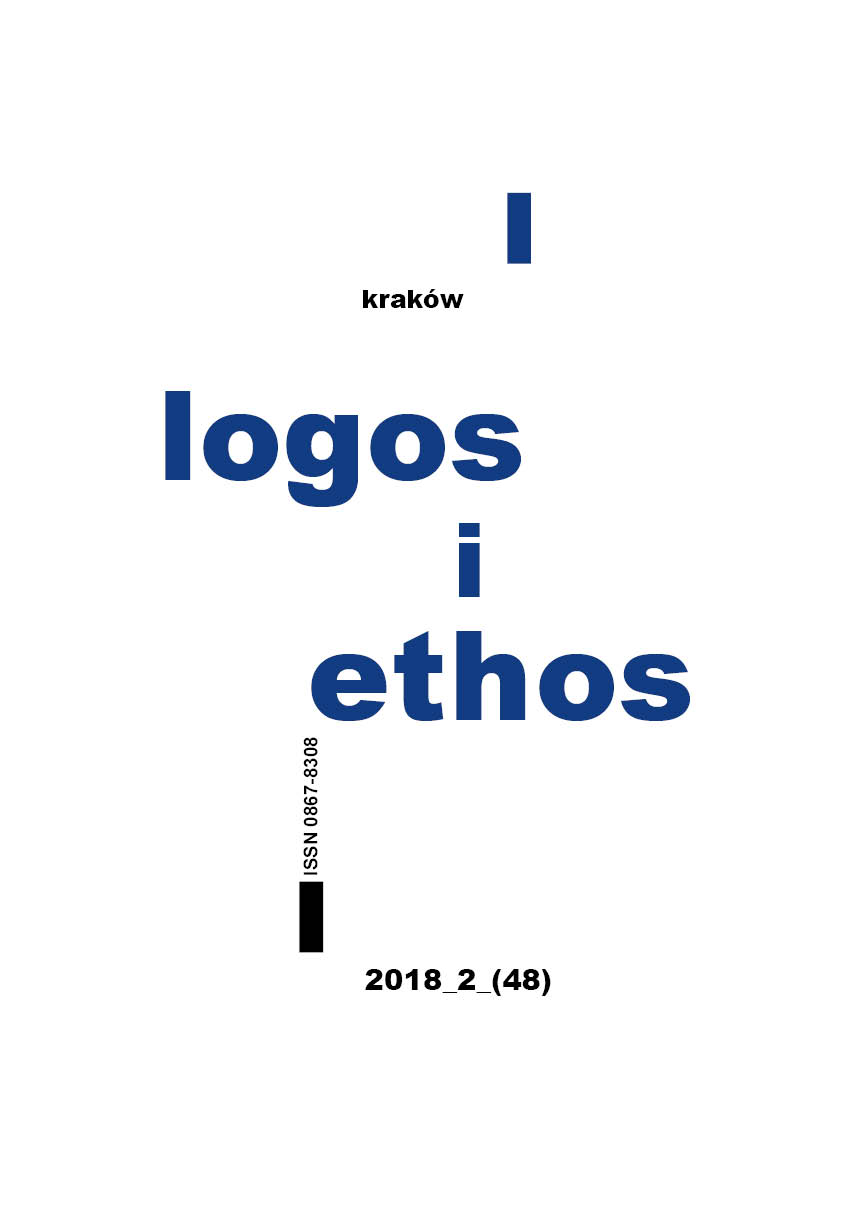Krucha podmiotowość, czyli o sporze na gruncie Lévinasowskiej i Ricœurowskiej filozofii człowieka oraz niektórych jego implikacjach dla rozumienia zdrowia psychicznego
DOI:
https://doi.org/10.15633/lie.2786Słowa kluczowe:
krucha podmiotowość, Lévinas, Ricœur, zdrowie psychiczne, schizofreniaAbstrakt
Poniższe studium stawia sobie jako zadanie skonfrontowanie dwóch koncepcji kruchej podmiotowości: jednej autorstwa Emmanuela Lévinasa i drugiej, wypracowanej przez Paula Ricœura. Zestawienie to nie jest wszelako celem samym w sobie. Owszem, chodzi w nim najpierw o wskazanie zbieżności i rozbieżności istniejących pomiędzy obydwoma ujęciami otwartego i labilnego w swej tożsamości ludzkiego podmiotu. Krok ów służy dalej uwydatnieniu punktów dyskusyjnych, które wskutek napięcia generowanego przez niezgodności pobudzają do myślenia i poszukiwania mediacji. W celu zilustrowania płodności tej kontrowersji zostaje ona przeniesiona na obszar filozofii psychiatrii, gdzie podejmuje się próbę zastosowania obydwu antropologicznych stanowisk w filozoficznej interpretacji istoty fenomenu schizofrenii. Zarysowana w ten sposób wykładnia patogenezy wybranego zjawiska pozwala z kolei na sformułowanie ostrożnych wniosków odnośnie do samego sporu Lévinasa i Ricœura w kwestii podmiotowości etycznej, a zwłaszcza co do odczytania ewolucji ich własnych koncepcji.
Bibliografia
Dąbrowski K., Co to jest zdrowie psychiczne?, w: Zdrowie psychiczne, red. K. Dąbrowski, Warszawa 1985, s. 7–35.
Dosse F., Paul Ricœur. Les sens d’une vie (1913-2005), Paris 2008.
Drwięga M., Człowiek między dobrem a złem. Studia z etyki współczesnej, Kraków 2012.
Grzywacz R., Afektywność i język. Tożsamość człowieka w fenomenologii życia M. Henry oraz w fenomenologii hermeneutycznej P. Ricœura, w: W trosce o człowieka. Paradygmaty stare i nowe, red. M. Szymczyk, R. Grzywacz, Kraków 2016, s. 179–194.
Grzywacz R., Wybrane aspekty rozumienia natury ludzkiej w ujęciu Paula Ricœura, w: Oblicza natury ludzkiej. Studia i rozprawy, red. P. Duchliński, G. Hołub, Kraków 2010, s. 195–224.
Jakubowski J., Skończoność egzystencjalna. Studium nad filozofią Paula Ricœura, Bydgoszcz 2017.
Jarnuszkiewicz A. SJ, Od systemu do etyki. Krytyka rozumu dialogicznego, Kraków 2012.
Kapusta A., Szaleństwo i metoda. Granice rozumienia w filozofii i psychiatrii, Lublin 2010.
Kępiński A., Schizofrenia, Warszawa 1981.
Kowalska M., Wstęp. Dialektyka bycia sobą, w: P. Ricœur, O sobie samym jako innym, tłum. B. Chełstowski, Warszawa 2018, s. VII–XXXVII.
Lévinas E., Ricœur P., L’unicité humaine du pronom Je, w: Éthique et responsabilité. Paul Ricœur, ed. J.-Ch. Aeschlimann, Boudry-Neuchâtel 1994, s. 35–37.
Lévinas E., Całość i nieskończoność. Esej o zewnętrzności, tłum. M. Kowalska, Warszawa 1998.
Lévinas E., Inaczej niż być lub ponad istotą, tłum. P. Mrówczyński, Warszawa 2000.
Mukoid E. A., Filozofia zła: Nabert, Marcel, Ricœur, Kraków 1993.
Ricœur P., A l’école de la phénoménologie, Paris 2004.
Ricœur P., Autrement. Lecture d’Autrement qu’être ou au-delà de l’essence d’Emmanuel Lévinas, Paris 1997.
Ricœur P., Cierpienie nie jest bólem, w: P. Ricœur, Filozofia osoby, tłum. M. Frankiewicz, Kraków 1992, s. 55–63.
Ricœur P., Czas i opowieść, t. 3: Czas opowiadany, tłum. U. Zbrzeźniak, Kraków 2008.
Ricœur P., Drogi rozpoznania. Wykłady Instytutu Nauk o Człowieku w Wiedniu, tłum. J. Margański, Kraków 2004.
Ricœur P., Le Juste, t. 2, Paris 2001.
Ricœur P., Miłość i sprawiedliwość, tłum. M. Drwięga, Kraków 2010.
Ricœur P., O sobie samym jako innym, tłum. B. Chełstowski, Warszawa 2018.
Ricœur P., Pamięć, historia, zapomnienie, tłum. J. Margański, Kraków 2007.
Ricœur P., Philosophie de la volonté, t. 1: Le volontaire et l’involontaire, Paris 2009.
Ricœur P., Philosophie de la volonté, t. 2: Finitude et culpabilité, livre 1: L’Homme faillible, Paris 2009, s. 35–199.
Ricœur P., Podług nadziei. Odczyty, szkice, studia, tłum. S. Cichowicz, M. Łukasiewicz i in., Warszawa 1991.
Ricœur P., Żyć aż do śmierci oraz fragmenty, tłum. A. Turczyn, Kraków 2008.
Rogóż D., Anty-Odyseja. Antropologia Emmanuela Lévinasa, Kraków 2012.
Saint-Cheron M. de, Rozmowy z Emmanuelem Lévinasem, tłum. K. Kot, Warszawa 2008.
Sautereau C., Subjectivité et vulnérabilité chez Ricœur et Lévinas, „Études Ricœuriennes/Ricœur Studies” 4 (2013) no. 2, s. 8–24.
Stanghellini G., Rosfort R., Emotions and Personhood. Exploring Fragility – Making Sense of Vulnerability, Oxford 2013.
Tischner J., Myślenie według wartości, Kraków 1982.
Tischner J., Spór o istnienie człowieka, Kraków 2011.
Wallace M. I., The Irony of Selfhood in Paul Ricœur’s Hermeneutic Philosophy, w: Between Suspicion and Sympathy. Paul Ricœur’s Unstable Equilibrium, ed. A. Wierciński, Toronto 2003, s. 161–171.
Warmbier A., Tożsamość, narracja i hermeneutyka siebie. Paula Ricœura filozofia człowieka, Kraków 2018.
Wierciński A., Celebrating the Confusion of Voices and the Fusion of Hermeneutic Horizons, w: Between Suspicion and Sympathy. Paul Ricœur’s Unstable Equilibrium, ed. A. Wierciński, Toronto 2003, s. IX–XIV.
Pobrania
Opublikowane
Numer
Dział
Licencja
Autorzy publikujący w czasopiśmie udzielają jego wydawcy zgody o następującej treści:
- Autor zachowuje autorskie prawa majątkowe do utworu, a jednocześnie udziela wydawcy czasopisma zgody na jego pierwszą publikację w wersji drukowanej i wersji online na licencji Creative Commons Uznanie autorstwa 4.0 Międzynarodowe oraz zgody na wykonywanie opracowań, w tym przekładów.
- Autor ma możliwość udzielania zgody niewyłącznej na opublikowanie utworu w wersji, która ukazała się w czasopiśmie (np. zamieszczenia go w repozytorium instytucjonalnym lub opublikowania w książce), wraz z informacją o jego pierwszej publikacji w czasopiśmie.
- Autor może umieścić swój utwór online (np. w repozytorium instytucjonalnym lub na swojej stronie internetowej) jeszcze przed zgłoszeniem utworu do czasopisma.

